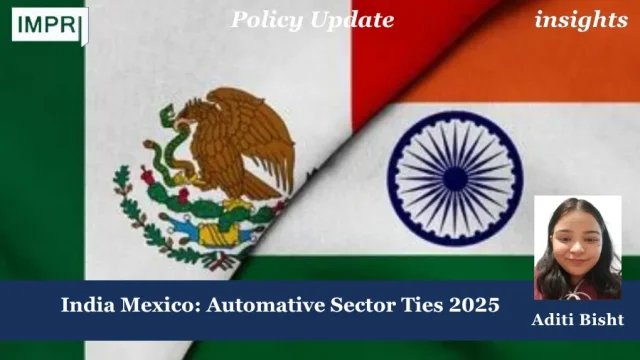Policy Update
Aditi Bisht

Image Source: The Diplomatist
Overview
India and Mexico have a long history of relationship, based on historical, cultural, and economic similarities. Both nations have varying geo-climatic conditions, rich diversity, and a similar civilizational legacy. Diplomatic relations were created between India and Mexico in 1950, making Mexico the first Latin American nation to establish relations with independent India. 2025 will celebrate the 75th anniversary of the India-Mexico relationship which will thus mark the diamond jubilee of a lasting partnership and the march of mutual benefit and growth (Embassy of India, Mexico City, 2025).
Over the decades, the two countries have established cooperation in several areas from agricultural research in the context of the Green Revolution to contemporary trade, investment, and innovation. The entire framework is based on mutual respect, shared democratic values, and participation in multilateral forums such as the United Nations and the G20. The relationship was more formally founded when a “Privileged Partnership” was established in 2007 during the historic visit of then Mexican President Felipe Calderon to India, a partnership that was subsequently raised to a “Strategic Partnership” through Prime Minister Narendra Modi’s visit to Mexico in 2016.
In recent years, it is clear that the economic dimension has become the central pillar of bilateral cooperation, particularly in the areas of trade and investment. By 2024, bilateral trade has reached USD 11.7 billion, thus making India the 11th commerical partner of Mexico, and Mexico the 20th commercial partner for India.
In particular, the automotive sector has become a flagship area of cooperation between India and Mexico, driven by nearshoring, or Indian firms increasingly investing in Mexico to access North American markets under the US-Mexico-Canada Agreement (USMCA).
Functioning
The operation of Mexico-India automotive collaboration involves a multi-layered architecture of trade, investment, and institutional collaboration. The two countries have utilized diplomatic and commercial platforms to establish not just joint ventures, but manufacturing linkages and technology transfer, to name a few. As the Indian Embassy in Mexico City reports, trade between both countries exceeded USD 11.7 billion in 2024, with automobiles and auto components among the more active sectors.
India’s automotive investment in Mexico is being guided by its own objectives to increase industrial complementarity through the larger India-Mexico Partnership for Development Cooperation. Indian auto and auto components manufacturers, facilitated by both embassies and diplomatic engagement, have established production and assembly bases in the strategic Mexican states of Guanajuato, Aguascalientes and San Luis Potosi, contributing to the fabric of North American supply chains made in Mexico.
This partnership is supported by a policy atmosphere in Mexico that promotes nearshoring and industrial diversification. A report by Mexico Business News (June 2024) shows that India has already pledged nearly USD 750 million to the Mexican automotive and auto parts industry where USD 550 million has already been disbursed and USD 200 million is planned for expansion. The working mechanism centers on Mexico’s open trade regime and its integration into the United States-Mexico-Canada Agreement (USMCA) which allows Indian companies to access the North American market.
Firms like Tata Motors, Sona, and TitanX have established a presence through local production, component sourcing, and logistics with the support of state-level industrial and investment promotion agencies. Investments not only allow technology and skills transfer; they also diversify supply chains by preventing reliance on traditional Asian quarters and may improve resilience through volatility in the broader global context of geopolitics.
Operationally, bilateral cooperation also functions via institutions and business facilitation. The Embassy of India in Mexico City works with Mexico’s Secretariat of Economy and the National Autoparts Industry (INA) to provide services with industrial matchmaking, investment facilitation, and sharing of information. Examples of the cooperative framework are events such as the “Diálogo de la Industria Automotriz 2024” where authorities from Mexico and foreign partners (including India) meet to discuss sustainability and supply chains.
Performance
When comparing measurable performance, the India–Mexico automotive partnership has grown steadily in recent years. The Embassy reports that Indian investment in Mexico, across all sectors, was about USD 4 billion, compared to about USD 810 million in Mexican investment in India. Automotive and auto parts are among the highest areas of India’s outward investment, and they receive considerable support to grow.
The Mexico Business News report (2024) emphasizes that Mexico is growing as an automotive hub globally. Mexico’s automotive sector was valued at USD 42.1 billion at the beginning of 2024, supported by strong demand for vehicles, auto parts, and semiconductors. The report evaluates this growth and the overall business environment in Mexico, which Indian companies are now leveraging. Additionally, Indian manufacturers have collaborated with local suppliers to promote industrial linkages, technology exchange, and supply chain resilience.
The activities of Indian companies, including Tata Motors, Sona, and TitanX, reflect India’s deeper intention of creating a sustainable industrial base to allow industrial input on a more sustainable basis. Simultaneously, the participation of the National Autoparts Industry (INA) in promotion of partnerships with Indian companies shows an increase in the existence of institutional mechanisms. The leadership at INA has explained that the sector is “growing not only because of Chinese or Taiwanese firms but it is advantageous for the Indian firms to operate in Mexico,” therefore, it is possible to mention that the situation with Indian firms in this context shows the emergence of India’s importance in the industrial space in Mexico.
In the same manner, engagement at the government level and related business delegations have assisted with the performance of the sector. In the case of the engagement of Indian Finance Minister Nirmala Sitharaman visiting in October 2024 with a business delegation helped lead to signing an MoU between the Confederation of Indian Industry (CII) and the Mexican Business Coordination Council (CCE). Other forms of engagement helped both sides with knowledge transfer and business-to-business engagement.
Impact
The expanding automotive partnership between India and Mexico has happened through a variety of economic and strategic advantages. Economically, it has provided jobs, increased technological cooperation and investment, and promoted bilateral trade. There are now more than 200 Indian companies operating in Mexico, many of which are involved in automotive manufacturing or support services. In 2025, the Embassy of India reported that in terms of the three best-performing sectors for Indian investments in Mexico, information technology, pharmaceuticals, and automotive industry have proven to be key areas of attraction.
Strategically, it has repositioned Mexico as the conduit for Indian entry into the North American market, as well as allowing Mexico to diversify its sources of foreign investment away from the United States and China. Indian companies are becoming anchored in the Mexican automotive value chain, and thus promote industrial upgrading for both countries.
On the policy front, there are initiatives, like the “Diálogo de la Industria Automotriz 2024” – hosted by the Mexican automotive industry – to bring stakeholders together on discussions of sustainability, domestic market expansion, and trade relations as part of the USMCA, to further strengthen collaboration and reach shared objectives. In fact, the rationale behind these discussions align closely with India’s own vision for green and inclusive industrial development.
The larger effect also includes the enhancement of diplomatic relations. Multiple high-level visits and institutions visits and dialogues — like the Foreign Office Consultations and sectoral cooperation agreements — have strengthened bilateral trust and provide an alignment in longer term policies. The Embassy’s data shows that this cooperation is being broadened to new areas, including innovation, science and technology, and education, along with the comprehensive foundation for continued engagement.
Emerging Issues
Although the India-Mexico automotive partnership is beneficial, a series of challenges and issues have emerged as follows:
- Regulatory Coordination: The differences in regulatory framework and standards occasionally delay the certification and market entry process.
- Supply Chain Volatility: Despite the advantages of nearshoring, both countries remain vulnerable to fluctuations in the price of raw materials globally.
- Technology Transfer Barriers: Ensuring that Indian and Mexican partners share knowledge equitably, remains an area of concern.
- Sustainability Goals: Both parties will have to come to terms with green manufacturing and environmental regulations, particularly for this industry as it transitions to electric vehicles.
- Infrastructure Gaps: Logistics costs and transportation costs in some states of Mexico still present challenges to smooth production and export.
To tackle these issues each government could encourage more institutional mechanisms such as joint working groups and encourage cross investment in joint R&D projects. Further working opportunities could be explored in the areas of electric mobility, clean energy integration, and digitalization of the supply chain to strengthen resiliency in the automotive sector.
Way forward
Both India and Mexico are poised to expand their partnership in the automotive sector moving forward. The Embassy of India (2025), reiterates its long term ambition of creating a Strategic Partnership that cuts across cooperation in trade, innovation, sustainability, and sustainability in Terms of Technology. The continued participation of Indian firms in Mexico’s automotive clusters shows confidence in Mexico’s power as a manufacturing hub.
As global manufacturing shifts towards diversification, nearshoring, and sustainability, India-Mexico can be a model case of South-South cooperation in the area of advanced manufacturing. I see recommendations for next steps, including improving policy coordination, enhancing joint ventures in electric vehicles and battery components, and developing Jennifer logistics coordination through the USMCA.
The transformation of the partnership from a focus on traditional trade to industrial co-creation is indicative of the maturity of India-Mexico relationship. Furthermore, both countries will mark 75 years of diplomatic relations in 2025. The automotive sector symbolizes our combined interests related to job creation, prosperity, innovation, and trust as a strategic partnership that not only drives their joint economies forward to a more sustainable and interconnected future.
References
About the Contributor:
Aditi Bisht is a Research Intern at IMPRI. She holds a bachelor’s degree in Journalism and Mass Communication from Vivekananda Institute of Professional Studies (VIPS). Her research interests lie in government policy and economics
Acknowledgment: The author sincerely thanks Ms. Aasthaba Jadeja and the IMPRI team for their valuable support.
Disclaimer: All views expressed in the article belong solely to the author and not necessarily in the organization.
Read More on IMPRI
Ishan Uday Special Scholarship Scheme for North East Region (2014): A Policy Analysis
India-New Zealand: Māori-Indian Cultural Linkages



















